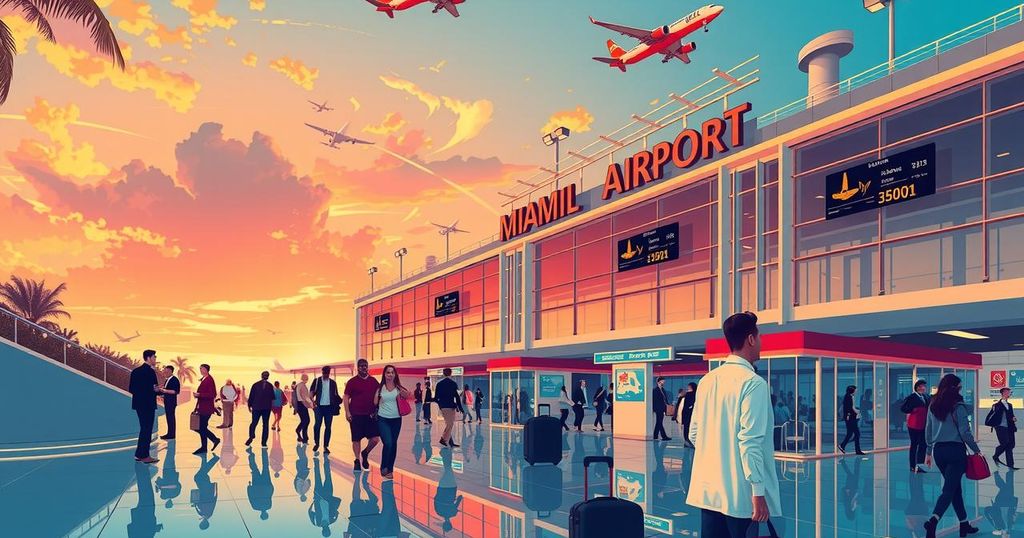Trump Travel Ban Takes Effect: What to Know in Miami as Restrictions Begin

President Trump’s travel ban takes effect today, restricting entry from over a dozen countries, notably Cuba, Venezuela, and Haiti, sparking concerns in South Florida. Local leaders criticise the ban for harming the community’s values and family structures. The situation at Miami International Airport seems normal, yet the uncertainty regarding valid visas remains.
President Donald Trump’s new travel ban, effective as of today, imposes restrictions on travelers from over a dozen countries. The administration cites national security as the reason for these limitations. In South Florida, where Cuban, Venezuelan, and Haitian communities are substantial, the impact of this ban is expected to be significant.
Notably, many Cuban and Venezuelan nationals are curtailed from entering the U.S. under the new regulations—a move that affects tourists, family visitors, and business travelers. However, green card holders are exempt from these restrictions. In addition, the ban places a full suspension on visas for immigrants and non-immigrants from several countries, Haiti being one of them.
As the ban went into effect at 12:01 a.m. Monday, Miami International Airport seemed to maintain its usual operations. Still, concerns arose among travelers regarding their ability to board flights with valid visas and their eventual admission into the United States.
Local reporters are on-site at Miami International Airport to gauge the ban’s immediate effects. There remain unanswered questions about who can actually enter the U.S. The State Department reassured travelers that those holding valid visas from the affected nations would be allowed to keep them, yet it is ultimately up to the Department of Homeland Security to grant permission at entry points.
Last week, officials in South Florida expressed strong disapproval of the travel ban affecting Cuba, Haiti, and Venezuela. These nations are among the 19 targeted by full or partial restrictions. Community leaders voiced their concerns, stating this policy threatens the livelihood and cohesion of local neighborhoods that are home to immigrants from these countries.
North Miami Mayor Alex Desulme remarked negatively on the reinstatement of the ban, calling it an “attack on the values of equity, compassion, and opportunity,” suggesting it would incite fear and tear apart families while adversely affecting valued communities contributing to the nation’s vitality.
The travel restrictions affect specific nations differently. Seven countries are facing partial restrictions: Cuba, Venezuela, Burundi, Laos, Sierra Leone, Togo, and Turkmenistan, where nationals cannot enter the U.S. for tourism, business, or student purposes. Meanwhile, nationals from 12 countries are completely barred from entry: Haiti, Afghanistan, Burma, Chad, the Republic of the Congo, Equatorial Guinea, Eritrea, Iran, Libya, Somalia, Sudan, and Yemen.
Regarding current visas, a State Department spokesperson indicated these would not be revoked, but the decision for entry remains solely with the Department of Homeland Security. In sum, the situation surrounding entry permissions is still murky, and many remain eager for clarity.
This story, published originally on June 9, 2025, at 9:50 AM, reflects the immediate reactions and implications of the travel ban, capturing the fears and uncertainties faced by many in South Florida today.
In summary, Trump’s travel ban has begun to cast a shadow over South Florida, particularly affecting travelers from Cuba, Venezuela, and Haiti. Local leaders have denounced the ban as discriminatory and damaging to the community. With specific countries either barred or facing strict restrictions, the complexities surrounding visa entry continue to create confusion among travelers. The situation will likely develop further as implications of the ban become clearer.
Original Source: www.miamiherald.com








